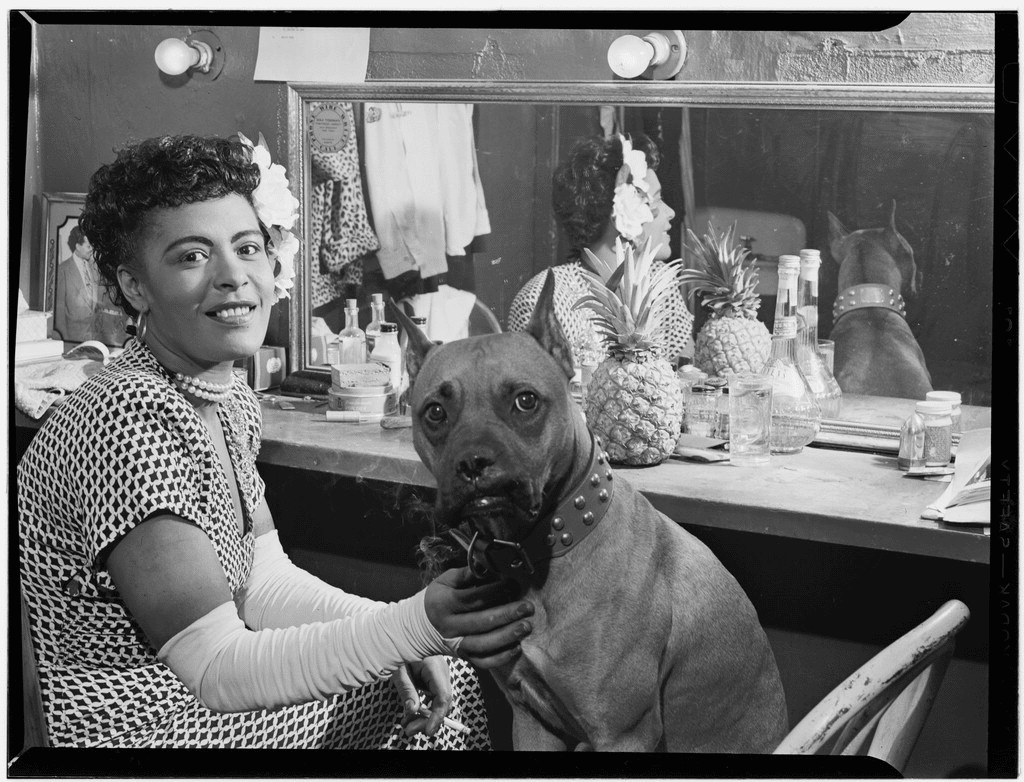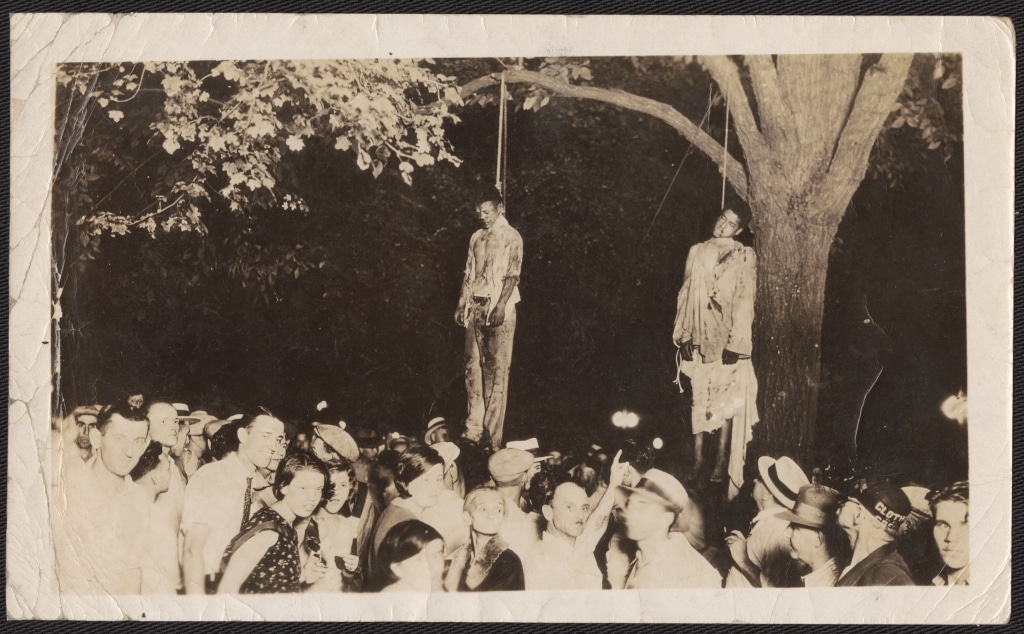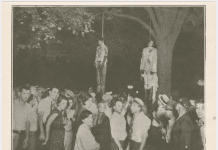
Forord
Den progressive lærer og redaktør fra Bronx i New York Abel Meeropol skrev under navnet Lewis Allan tekst og melodi til den vigtigste og stærkeste sang “Strange Fruit” mod racisme og lynchning, som Billie Holiday indspillede 20. april 1939.
Abel Meeropol adopterede senere de to sønner efter kommunisterne Ethel og Julius Rosenberg, der i juni 1953 blev henrettet for spionage til fordel for Sovjetunionen. (Se linkboxen Rosenberg-sagen og McCarthyismen / The Rosenberg Case and McCarthyism).
Inspirationen for sangen var dette billede fra 1930:

Se om denne dobbelt-lynchning og dette foto længere nede og i linkboxen Marion-lynchningen og fotografiet bag “Strange Fruit” (Socialistisk Bibliotek).
Se:
Strange Fruit (Wikipedia.org). Om baggrunden for sangen, forfatteren/komponisten og indspilningen.
The United States vs. Billie Holiday (Wikipedia.org). Om Lee Daniels 2021-film. Se anmeldelse af Arne Lennartz: En følsom men trodsig kvinde indtager scenen (Arbejderen.dk, 27. maj 2021).
Strange Fruit. A movie by Daniel Weidlein (YouTube, 9:59 min.). Med tekst læst og interview om sangens historie.
Strange Fruit. By Billie Holiday (1959) (YuoTube, 3:18 min.):
Other versions from YouTube.com:
- Nina Simone Strange Fruit Remixed By Montecristo
- Beth Hart
- AaRON – Strange Fruit
- Siouxsie And The Banshees – Strange Fruit (unofficial version)
- Strange Fruit- Hip Hop Version
Se også på YouTube.com for andre tekster af Abel Meeropol / Lewis Allan:
The House I Live In (1945) (10:15 min.). Film med en ung Frank Sinatra (fik æres-Oscar 1946), med manuskript af Albert Maltz, titelsang af Abel Meeropol, om religiøs tolerance og folkefronts-patriotisme. Læs mere om filmen på Wikipedia.org.
The House I live In – Frank Sinatra 1991 (YouTube, 5:21 min.)
Også indspillet med den progressive bassanger Paul Robeson:
“The House I Live In” (Paul Robeson) (1947) (YouTube, 3:12 min.).
Artikler/Articles
“Strange Fruit” – en grufuld sang, som Billie Holiday gjorde til et hit. Af Margit Andersen (Arbejderen.dk, 6. november 2021).
“I 1939, da Billie Holiday første gang fremførte ‘Strange Fruit’, var politiske protestsange så langt fra ukendte i USA, men det var nyt at bruge dem i underholdningsbranchen. Pladeselskabet Columbia nægtede at indspille sangen, som blev et hit, og Holiday tog den med sig overalt, hvor hun optrådte.”
Strange fruit (pdf). Af Morten Thing (Social Kritik, nr.75, 2001, s.42-47; online på RUC). Anmeldelse af James Allen, Hilton Als og Leon F. Litwack, Without Sanctuary: Lynching photography in America (Twin Palms Publishers, 2000, 209 p.).
“[Den] mest tankevækkende bog jeg længe har læst. Den handler om lynchning i USA og består af ca. 100 fotografier af lynchninger og et par essays, hvoraf især et historisk essay af Leon F. Litwack påkalder sig kvalme og interesse.” Se også bogens site.
In English:
Strange convergence (Socialist Worker.org, April 9, 2015).
“Robert Meeropol is the younger son of Ethel and Julius Rosenberg … here from his blog about what would have been his mother’s and singer Billie Holiday’s 100th birthday.” With link to video with Robert Meeropol about the song ‘Strange Fruit’.”
Billie Holiday and Strange Fruit in the 21st Century. By Alexander Billet (Dissident Voice, September 28, 2007).
“It is truly amazing how heart-rending this song remains. Almost seventy years later it still sends chills up the spine and sticks hair on end.”
Stranger than fiction. By Jody Kolodzey (In These Times, March 24, 2003).
“… a hymn to the power of music to bring people together across the boundaries of race, religion, culture, geography and time.”
An anthem for the struggle against racism. By Amy Muldoo (Socialist Worker, US, Issue 433, December 13, 2002).
“Strange Fruit, a 2001 documentary by Joel Katz now showing at New York’s Film Forum, explores the history of the song and the political moment that gave birth to it.”
‘Strange Fruit’: the story of a song. By Peter Daniels (World Socialist Web Site, 8 February 2002).
“The history is related in Margolick’s book (Strange Fruit: Billie Holiday, Cafe Society, and a Cry for Civil Rights), as well as in the film, Strange Fruit, which received its world premiere last month at the Film Society of Lincoln Center.”
The singer or the song? By Nick Grant (Socialist Review, Issue 255, September 2001). Review of David Margolick, Strange Fruit (Payback Press, 2001). Scroll down.
“This slim, meticulous work is both a scrapbook chronicle of reactions to a song first recorded in 1939, and a fascinating case study in the tug of war between art and propaganda.”
A song that changed the world. By Nicole Colson (Socialist Worker, US, Issue 369, May 25, 2001).
“David Margolick’s fascinating book Strange Fruit: The Biography of a Song tells the history of the song’s creation – and how it’s been received over the past 60 years.”
Se også:
- Billie Holiday (Wikipedia.org)
- Billie and Bessie (1984) (David Widgery: Preserving Disorder, Pluto Press, London 1989, p.76-87)
- Strange Fruit (novel) (Wikipedia.org)
- Lillian Smith (author) (Wikipedia.org)
- Sælsom Frugt. Af Lillian Smith (Gyldendals Forlag, 1946; 2. oplag 1961, 393 sider)
- Lynching in the United States (Wikipedia.org)
- Great jazz vocalist dishonored by The United States vs. Billie Holiday — can’t we do better? By John Andrews (World Socialist Web Sites, 6 July 2021). “Lee Daniels’ film, with Andra Day, does a disservice to the memory of the music legend.”
- Nearly 4,000 blacks were lynched in Jim Crow South, report finds. By Tom Mackaman (World Socialist Web Site, 17 February 2015). See the report summary: Lynching in America (Equal Justice Initiative, 2015, 25 p.)
- The Negro Question – The economics of lynching. By J.R. Johnson [C.L.R. James] (Socialist Appeal, Vol. IV, No. 6, 10 February 194; online at Marxists’ Internet Archive).
“… lynching is rooted in the economic system [‘the price of cotton’] and even the very forms it takes are conditioned by the specific class relations of the two races.”
Se også på Socialistisk Bibliotek:






























